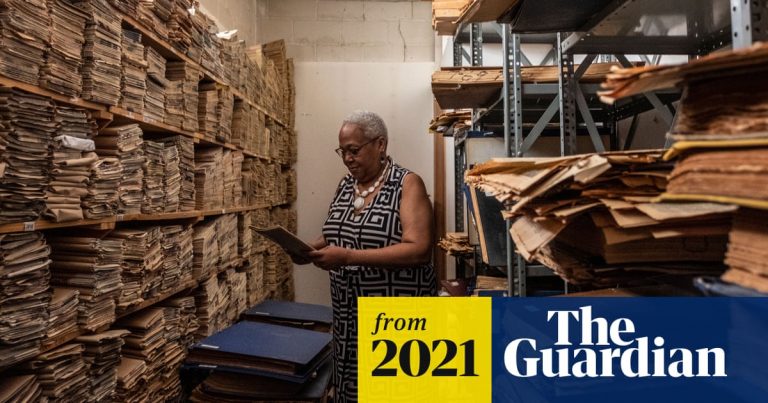Just five blocks away from the crossroads of 38th and Chicago, where the world watched Derek Chauvin murder George Floyd last May, sits the oldest Black newspaper in Minnesota: the Spokesman-Recorder.
The almost 87-year-old paper was originally two Black newspapers, the Saint Paul Recorder and the Minneapolis Spokesman, launched by civil rights activist Cecil Newman. In 1976, when he died, his wife, Launa Newman, ran the paper until she was 86. In her retirement, Newman passed the paper down to her granddaughter: Tracey Williams-Dillard.
Now Williams-Dillard heads the paper from the same desk where her grandfather once sat. Williams-Dillard started at the Minnesota Spokesman-Recorder, one of the longest-standing family-owned newspapers in the United States when she was eight – the same age her grandfather was when he started his first newspaper.
The weekly paper, rooted in the heart of a historically Black neighborhood, has made it its goal to uplift Black voices and connect to its readers through its predominantly Black staff since 1934 under the idea “from the Black people, to the Black people”.
In the year since Floyd was killed by a white police officer – which triggered a wave of protests that spread across America and the world – that mission has never felt more vital, or more urgent.
Williams-Dillard, the chief executive and publisher, explained how important it is for Black people to consume Black media because of how stigmatizing other media outlets can still be when covering Black stories. “You would only know the negative news about your people. You wouldn’t know about the positive things that we’re doing,” she told the Guardian.
Williams-Dillard said her team of journalists work tirelessly to pay attention to poignant details to help tell a well-rounded narrative.
“We don’t want our community to just get drowned in bad news. We have to give them hope, we have to give them light,” Williams-Dillard said from behind the desk that has been in the building since its founding.
The need for Black media outlets that speak directly to Black communities has become critical as issues of police brutality and race have made headlines. Aside from Floyd’s death, numerous other cases of police racism and shootings of Black people have roiled America over the past year. And, while such stories have featured prominently in mainstream media, many people have been critical of much of the coverage when it comes to reporting Black perspectives and experience.
“Without us telling the story, it doesn’t get told from our perspective. We’re just telling the news how it is without trying to sensationalize it or spin it in a negative way,” Williams-Dillard said. “Without that, our community would be lost; our community wouldn’t have media that speaks to them from them.”
Compared to other outlets, Williams-Dilliard said that the same story from the Spokesman-Recorder juxtaposed with non-Black centered outlets, tells a “completely different” story.
While the Black media is geared towards the Black community, the outlet has become an educational tool for non-Black people as well to get a glimpse into what the community is feeling and experiencing.
“They’re able to see it how we see it from our eyes,” the 61-year old said. “You reach the Black community by going through the Black media.”
The Black media outlet hasn’t always had the easiest time. Financial hardships in the early 2000s forced Williams-Dillard and her staff to work without pay. The staff went without pay for a year and Williams-Dillard went without pay for two years. Yet in their dedication to telling Black stories, her staff persisted.
“I lost no one; no one left me. They all said, ‘We’re in here for the long haul,’” said Williams-Dillard, in the office which still has her grandfather’s name on the door.
Her “soldiers” have passed many milestones since their challenging period to ensure their permanents.
The 66-year-old building, which was designated a local historic landmark in 2015, oozes with personality, and adds color to the community as the faces of the three generations of family members that have kept the outlet afloat are depicted on the side of the building. The inside is filled with journalistic artifacts and walls made more beautiful by posters of Black leaders and paintings.
Recently, the Spokesman-Recorder received some good news of its own. The outlet was named one of six finalists out of over a hundred submissions for the Deluxe Company’s film series, Small Business Revolution which is set to hit Hulu and Amazon Prime late fall. This year, the Deluxe Company focused on Black-owned businesses based in Minneapolis and St Paul where they will help with websites, logos, payment solutions and anything the selected organizations need to promote its business.
With the help of Deluxe, the Spokesman-Recorder aims to be even more enabled to provide coverage of Black communities and issues in the years ahead as the impact of Floyd’s death and the protests it triggered continue to unfold.
“The Black community is hurting, they’ve been hurting for a long time as these situations continue to happen,” Williams-Dillard said.
“It was important for the black press to be able to tell the story from the real side and really help people across the nation and locally understand what’s really going on in that courtroom and on the ground.”





